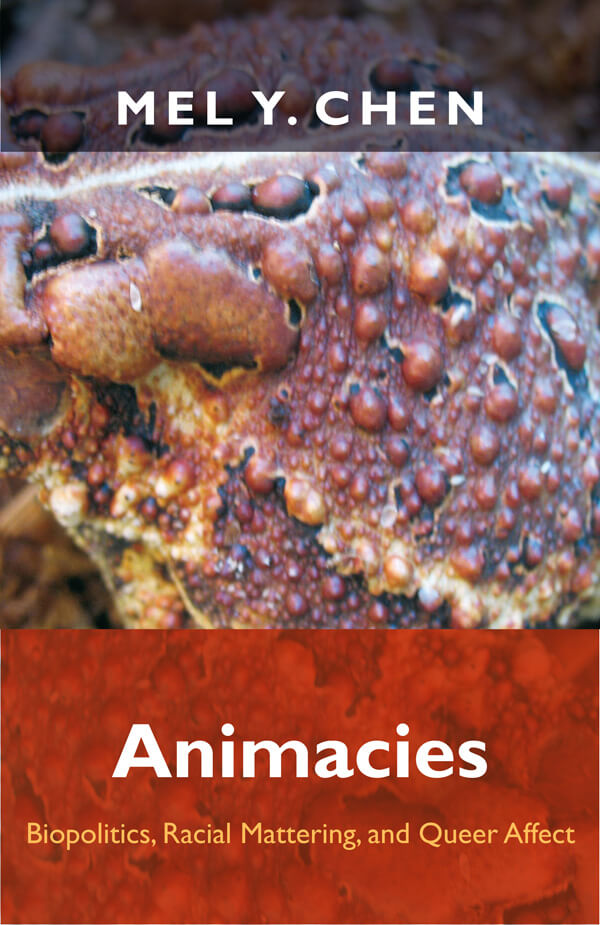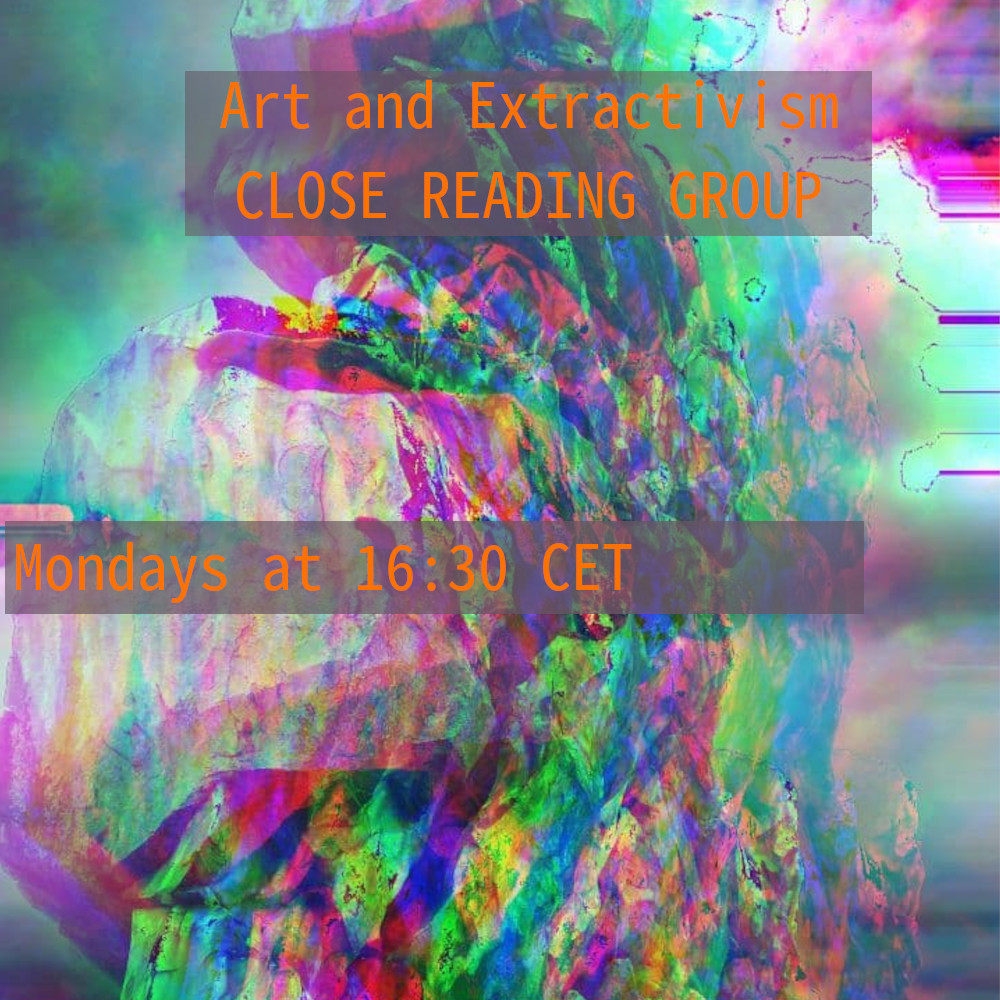NEXT SESSIONS
Text: Mel Y. Chen “Animacies: Biopolitics, Racial Mattering and Queer Affect”
Next Sessions:
Monday 4 July 2022 at 16:30 – Hopscotch Auxiliary Room (Gerichtstrasse 45, Berlin) and online
Monday 11 July 2022 at 16:30 – Hopscotch Auxiliary Room (Gerichtstrasse 45, Berlin) and online
https://www.facebook.com/events/534875094963552/534875101630218/
You can also join the event on Discord: https://discord.gg/vTHMdtRUdJ
Join us as we read Mel Y. Chen “Animacies: Biopolitics, Racial Mattering and Queer Affect”.

ABOUT THE TEXT
“In Animacies, Mel Y. Chen draws on recent debates about sexuality, race, and affect to examine how matter that is considered insensate, immobile, or deathly animates cultural lives. Toward that end, Chen investigates the blurry division between the living and the dead, or that which is beyond the human or animal.”
OUR APPROACH
READING AND DISCUSSING TOGETHER. This reading group is especially oriented towards reading together rather than reading outside the group. We hope that this close reading strategy can be a small act of resistance against the cultural colonization of Western academia, the hegemony of English, and the codified distinctions between the academic and the “non-academic” or the artist. There is no commitment to join for more than one session. Non academics who want to involve critical theory in their work but normally don’t have access to text based resources or the time to do research are encouraged to take part. We also make space for defining and translating words for non-native speakers who don’t have access to translations into their home language(s).
WHAT WE EXPLORE
ART AND EXTRACTIVISM investigates how extractive processes (environmental, intellectual, and physical) are replicated within the performing and in particular the sonic arts. The concept of extractivism situates all kinds of “innocent practices” as carrying the potential for exploitation and harm. We use extractivism in order to problematise a number of related phenomena—from the environmental extracation of minerals, gas and water from the ground, we expand to include the extraction of (creative) labour from (precarious) bodies, the recording of sounds, words, ideas and images from sentient beings, as well as the “mining of the exotic” in terms of content branding and other new economies from our very selves.
ART AND EXTRACTIVISM explores the following questions: What are the problematics of extraction which appear within (always-already) hierarchical collaborations? How can processes compromised by extractive dynamics resist extraction? How can we name them, rather than erase them? What are the limitations of the extractivist framework? Are there other ways of finding reciprocal relations between artists, subjects, and nature?
ART AND EXTRACTIVISM itself should resist extractivist practices by reaching towards collective practice, whereby each member chooses one text (one chapter or short text selection) that they feel could shed light on the topic. We will read the text together, rather than outside of the group, and discuss the text within the meeting time. Since it is assumed that members of the group are not supported financially to spend time researching, or in general supported by arts or academic institutions, the group aims towards generating conversation and thought that can be useful towards our work and not become extractive labour.
To that end, ART AND EXTRACTIVISM is also geared towards non-academics who wish to involve critical theory in their work. The idea of the group is to provide a safe space to discuss critical theory outside of established spheres of audibility (i.e., the academic classroom) and to create an environment where those who generally think of themselves as non-academics can interact with critical theory without the pressure of competing or keeping up with others’ knowledges. We will work towards establishing dialogue amongst artists and workers who would like to engage with some of the body of academic work which has been done “about” the worker or the artist, and see how we can relate it to our everyday and real world experiences. In this sense we attempt to resist the extractivist practice that theory engages on the body of the worker or artist.
RESOURCES
SOME OF THE BOOKS that we are reading include:
- Planetary Mine: Territories of Extraction Under Late Capitalism – Martin Arboleda
- The Burnout Society – Byung-Chul Han
- Freedom, Justice and Decolonization – Lewis R. Gordon
- Sylvia Winter: On Being Human as Praxis – Katherine McKittrick, Editor
- Animacies: Biopolitics, Racial Mattering and Queer Affect – Mel Y. Chen
- The Promise of Happiness – Sarah Ahmed
- Hunting&Collecting – Sammy Baloji
- On the Post Colony – Achille Mbembe
- Necropolitics – Achille Mbembe
- A Billion Black Anthropocenes or None – Kathryn Yusoff
- On Inhumanity – David Livingstone Smith
- Unthinking Mastery: Dehumanism and Decolonial Entanglements – Julietta Singh
- Imperial Mud – James Boyce
- Resource Radicals: From Petro-Nationalism to Post-Extractivism in Ecuador – Thea Riofrancos
- On Decoloniality: Concepts, Analytics, Praxis – Walter D. Mignolo and Catherine E. Walsh
- The Extractive Zone: Social Ecologies and Decolonial Perspectives – Macarena Gómez-Barris
- Becoming Human: Matter and Meaning in an Antiblack World – Zakiyyah Iman Jackson
Past Sessions
ongoing Berlin, Germany: Hopscotch Reading Room Auxiliary Space Wedding
20 + 27.06.2022 Hamburg, Germany: Kampnagel KX Studio
26.09.2021 Cluj, Romania: CASA TRANZIT
24.09.2021 Bucharest, Romania: ATELIERELE MALMAISON
15.09.2021 Prague, Czechia: Synth Library Prague: Various Artists – Art and Extractivism, Prague, CZ
14.08.2021 Lithuania: Kombinatas Left Festival
